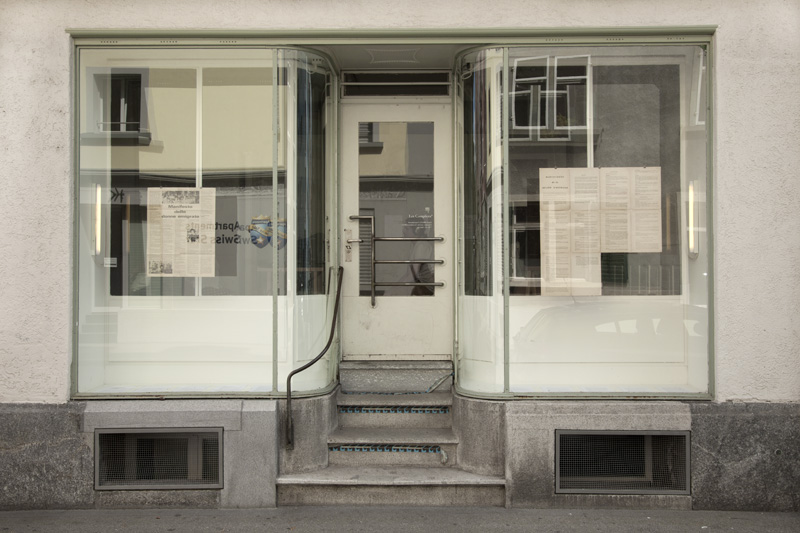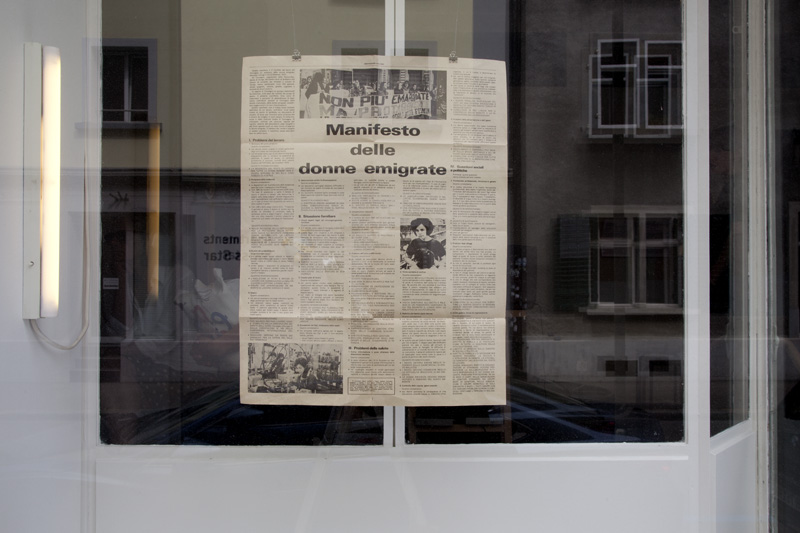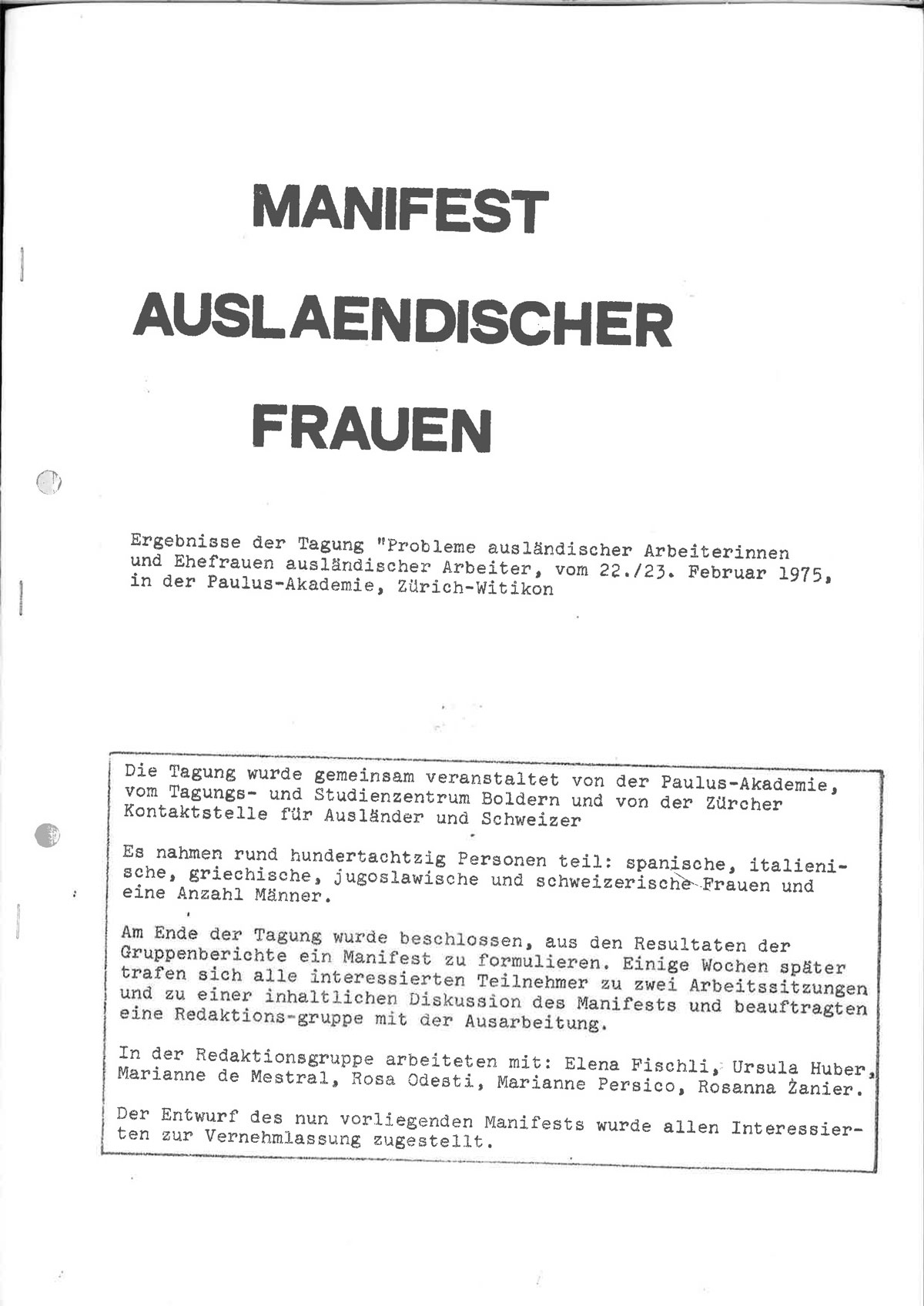We Demand!
Research on the «Manifest ausländischer Frauen» from 1975
by Vera Ryser and Sally Schonfeldt
 Emigrazione Italiana, 28. Jg. Nr. 36 (Sept. 1975), Sozialarchiv Zürich
Emigrazione Italiana, 28. Jg. Nr. 36 (Sept. 1975), Sozialarchiv ZürichIn February 1975 180 women of different nationalities wrote the “Manifesto of foreign women“. The women demanded progressive civil, political and social rights and fought publicly for better working conditions and for their recognition within Swiss society. The manifesto was written in 1975 within the framework of the conference “Problems of foreign women workers and wives of foreign workers“ at the Paulus Academy in Zurich. At the two-day meeting the women came together and in small groups and plenary sessions discussed the triple discrimination of their position as women, as migrants and as workers. At the end of the conference a smaller editorial group wrote the Manifesto, which included both the problems experienced and described by the women, as well as demands and solutions. The manifesto represents a comprehensive compilation of the conditions and lives of women immigrants at that time and demanded for example equal pay, right to political participation, a revision of the existing provisions relating to maternity protection, more flexible working hours for men and women with children and the abolition of seasonal worker status. The women sent the manifesto to unions, religious organizations, women‘s associations and political parties in Switzerland and invited them in November 1975 to a second conference, which was advertised under the slogan “Opinions on the Manifesto of foreign women“. Although some opinions from the Church, women‘s organizations and trade unions were positive the manifesto was generally felt to be too demanding, too emotionally charged, polemical, excessive, untrue and not objective enough. For a brief moment the women succeeded in gaining attention for their political demands however their efforts and demands were soon forgotten and had no immediate political consequences.
Today forty years have passed since the manifesto was written and yet many of the demands are still not a reality, in spite of them being even more relevant in the present time. Especially within the context of the on-going public debate on migration in Switzerland it seems pertinent to ask the authors of this manifesto about their work experience and political participation over the last forty years. What has the manifesto achieved and what has it not? Which of the manifesto’s demands do they consider as having been realised already and which are still relevant to today? How has the situation of migrant women and women in general within Swiss society changed over these forty years? And what meaning did the writing of the manifesto have for their personal and political contemplations? Confrontation with these issues is extremely important for Swiss historical conscious-ness as both migrants and women are too often undervalued within it.
The “Manifesto of foreign women“ was investigated historically for the first time in a chapter of the recently published book by Sarah Baumann “... and the women also came...“1 and examined through sources from the Colonie Libere and the Contact Centre for Italians and Foreigners. The exhibition project We Demand! by Vera Ryser and Sally Schonfeldt, which took place in Les Complices* in Zurich in June and July 2016, was based on this research, however it placed the women’s stories in the foreground, which were shown in seven narrative interviews with women who participated in the manifesto. The exhibition thus provided a space that enabled a focused review of a forgotten event and at the same time asked how and by whom our contemporary history was constructed. The interviews allow a deeper understanding of the experiences of politically active immigrants and Swiss women in the 1970s, which until very recently have only been selectively and academically examined. The interviews with these progressive women critically examine the development of Swiss migration history and politics over the last forty years as well as examining the historical and contemporary role of the voices of migrant women and women in Switzerland. It is time that this manifesto gains a wide audience and the attention it deserves forty years after its first publication.
Today forty years have passed since the manifesto was written and yet many of the demands are still not a reality, in spite of them being even more relevant in the present time. Especially within the context of the on-going public debate on migration in Switzerland it seems pertinent to ask the authors of this manifesto about their work experience and political participation over the last forty years. What has the manifesto achieved and what has it not? Which of the manifesto’s demands do they consider as having been realised already and which are still relevant to today? How has the situation of migrant women and women in general within Swiss society changed over these forty years? And what meaning did the writing of the manifesto have for their personal and political contemplations? Confrontation with these issues is extremely important for Swiss historical conscious-ness as both migrants and women are too often undervalued within it.
The “Manifesto of foreign women“ was investigated historically for the first time in a chapter of the recently published book by Sarah Baumann “... and the women also came...“1 and examined through sources from the Colonie Libere and the Contact Centre for Italians and Foreigners. The exhibition project We Demand! by Vera Ryser and Sally Schonfeldt, which took place in Les Complices* in Zurich in June and July 2016, was based on this research, however it placed the women’s stories in the foreground, which were shown in seven narrative interviews with women who participated in the manifesto. The exhibition thus provided a space that enabled a focused review of a forgotten event and at the same time asked how and by whom our contemporary history was constructed. The interviews allow a deeper understanding of the experiences of politically active immigrants and Swiss women in the 1970s, which until very recently have only been selectively and academically examined. The interviews with these progressive women critically examine the development of Swiss migration history and politics over the last forty years as well as examining the historical and contemporary role of the voices of migrant women and women in Switzerland. It is time that this manifesto gains a wide audience and the attention it deserves forty years after its first publication.
Interview with Mercedes Soto. Ryser+Schonfeldt, 2017.







installation views at Les Complices*, 2016 ©Nathalie Bissig
Sally Schonfeldt is an artist who lives and works in Zurich. She investigates in her works how knowledge is produced and established. She questions who wields power over determining history and memory. By using historiography to question methods of knowledge production in relation to anti-colonial discourses and the position of women in history she repeatedly challenges Eurocentric historiographies. Her works seek to generate alternative possibilities of interacting with history and contribute to the construction of new narratives in juxtaposition to those enshrined within the Eurocentric canon.
Vera Ryser is an artist and researcher who lives and works in Zurich. In her artistic research, she deals with historical and socio-political processes and strives to update these topics beyond the supposedly clear boundaries of practice and theory. Her search for representations of an aesthetic production of knowledge is characterized by collaborations with researchers, artists and experts.
- 1. Baumann, Sarah: «… und es kamen auch Frauen». Engagement italienischer Migrantinnen in Politik und Gesellschaft der Nachkriegsschweiz. Zürich 2014.
-
The exhibition We Demand! A research on the «Manifesto of foreign women» from 1975 by Vera Ryser and Sally Schonfeldt took place at Les Complices* in Zurich from 11 June until 30 July 2016, as part of Manifesta 11 Parallel Events, in collaboration with Rosanna Ambrosi, Rosita Fibbi, Marianne de Mestral, Giovanna Meyer Sabino, Lucina Parazzini, Marianne Sigg and Mercedes Soto.

